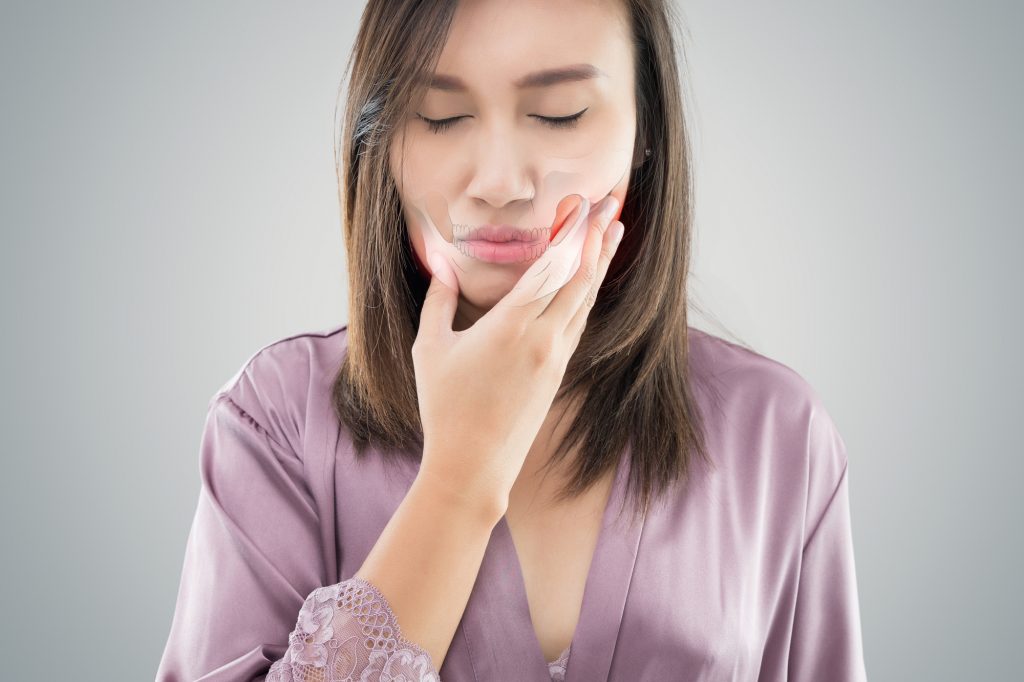
Do you sometimes feel pain or tenderness in your jaw or around your ear, or have trouble chewing and opening and closing your mouth? If so, you may have a TMJ disorder (TMD).
People suffering from TMD may also hear a clicking or popping sound in the jaw or their jaw may even lock up. Some people may even experience a ringing in the ears.
What is TMJ?
TMJ stands for the temporomandibular joint which according to the Mayo Clinic “acts like a sliding hinge, connecting your jawbone to your skull”. You have a TMJ on both sides of your jaw.
Typically TMJ Disorders are caused by arthritis or a jaw injury or a problem with jaw alignment. Sometimes if you clench or grind your teeth a lot, that can exacerbate problems with your TMJ too.
Women, especially during their childbearing years, are at higher risk for TMJ disorders because of magnesium deficiency.
The Cleveland Clinic reports that “treatments range from simple self-care practices and conservative treatments to injections and open surgery”.
Their experts added, “Self care measures include eating soft foods, using moist heat and cold packs, and using mouth splints. Surgical options include flushing out the joint with fluids, removing inflamed tissue and realigning parts of the jaw joint.”
Medications can also sometimes help including non-steroidal anti-inflammatory drugs and muscle relaxants. Some people also get relief from corticosteroid injections that can reduce pain and inflammation.
Another option is undergoing arthrocentesis, a procedure where small needle are inserted into the joint to irrigate the joint and get rid of any inflammation.
If you are experiencing any of these symptoms along with jaw pain, then get evaluated by a doctor or dentist as soon as possible. They will do a physical evaluation, pressing on areas around the jaw to see if there is any tenderness or soreness. They might also request a dental x-ray or a CT scan or MRI to get a closer look at what is really going on.
Will Invisalign Fix TMJ?
While there has been a lot of research done on Invisalign’s effect on TMD, the evidence remains inconclusive. However, as long as there is no pathology present in the TMJ, the aligners have been found to good at relieving some of the symptoms of TMD.
Because you are wearing the clear, plastic aligners 20 to 22 hours a day, the aligners help protect your teeth from grinding at night which is referred to sleep bruxism and can inflame the TMJ. Invisalign aligners also realign your upper and lower jaws so you can open and close your mouth to chew and speak properly which also can relieve TMD symptoms.
Invisalign treatment can help with the following orthodontic issues: crooked teeth, an overbite, crossbite (when some of the upper teeth sit inside the lower teeth), gaps in teeth as long as they are not too big, open bite (when upper and lower teeth don’t meet) and crowded teeth. There are some complex problems that Invisalign can’t help with though.
Invisalign has also been linked with causing TMJ problems. In certain cases, wearing Invisalign can either exacerbate a previous TMJ issue or cause a patient to develop a problem with their TMJ.
Will Invisalign fix TMJ? No matter how you choose to solve your TMJ, it is important to do your research and to consult with a few orthodontists before making any final decisions. Factors like cost, length of treatment and number of restrictions can all play a role.
Just make sure you don’t put off treatment until your condition is a lot more severe. Beside the TMJ getting worse, you will also be at greater risk of cavities and gum disease because it will be more difficult to practice good oral hygiene when you are in a lot of pain.
If you choose to go with Invisalign, remember when choosing an orthodontist their Invisalign designation matters. It is a given that when you do something day in and day out that you will become skilled at it. The same applies with orthodontic work. Those orthodontists who provide Invisalign treatment to their patients on a daily basis are going to have a leg up on their colleagues who may mostly work with metal braces.
Invisalign offers four designations for its providers, Preferred, Premier, Premier Elite and Diamond Plus based on how many patients they have treated with Invisalign. Choosing an orthodontist with Preferred status will give you the confidence that your orthodontist is very experienced with this type of treatment. For top level experience though you should choose a provider with the distinction of being a Diamond Plus Provider.
While an Invisalign provider’s designation is important, it is just one aspect of the orthodontist practice that you should be considering when make a choice for where to go. How they treat their patients, cost of their services and how comfortable you feel in your surroundings all also should play a role in your decision.
As an Invisalign Diamond Plus provider, Orthodontics Limited is one of the top orthodontists in the Philadelphia area. When looking for Invisalign in Philadelphia and Invisalign in Center City, they are the smart choice. Orthodontics Limited also has proven success in other types of treatments as well. Give them a call today to schedule your free initial consultation.

